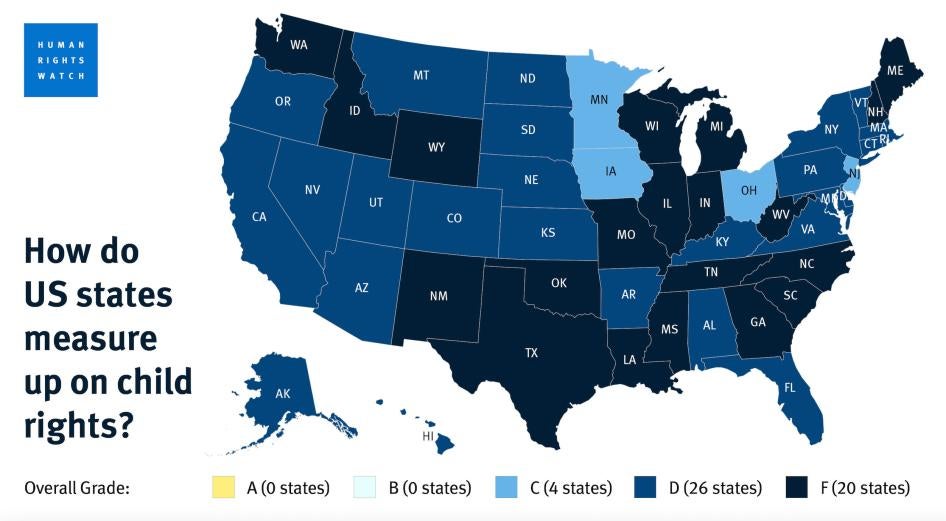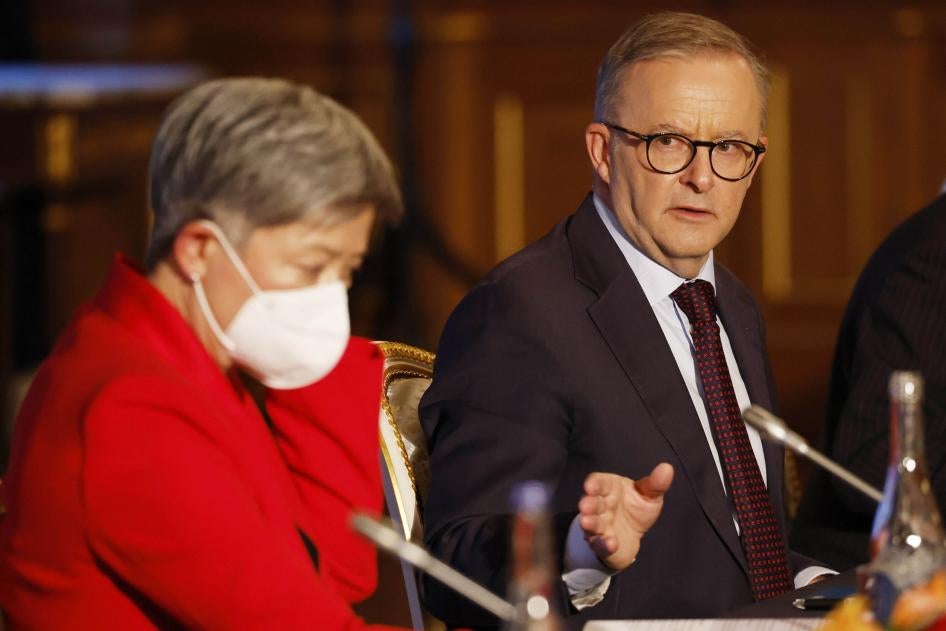Myanmar’s Hidden Cruelty: Daily Brief
- Deaths in Custody under Myanmar’s Junta;
- Failing Grades on Children’s Rights in the US;
- Will Australia Act on Latest Xinjiang Evidence?;
- Take Note;
- Discussion: Rights under Pressure;
- Reader Reaction: From Horror to Hope;
- Quote of the Day: Climate Crisis.
By Andrew Stroehlein. Contact me at DailyBriefTeam@hrw.org and Twitter @astroehlein.
Myanmar’s Hidden Cruelty
When a vicious military junta is openly shooting people dead in the streets, it may be difficult to see the more hidden atrocities it is also committing, deaths in detention among them.
Since the coup on February 1, 2021, Myanmar’s police and military have been responsible for the deaths of scores of people in custody, from apparent torture or denial of medical care. Human Rights Watch has newly documented six cases.
The six men were all political activists or vocal opponents of the military junta in Yangon, Mandalay, and Sagaing Regions.
Of course, authorities have neither seriously investigated these deaths nor taken action against those responsible. This just encourages more horrific abuse from a junta known for its cruelty and widespread abuses that amount to crimes against humanity.
These six cases are evidence of a much wider problem. The Assistance Association for Political Prisoners estimates at least 73 people have died in police stations, military interrogation centers, and prisons since the coup. That number is only a small percentage of the at least 690 people killed shortly after being apprehended by the security forces, often during military operations in ethnic minority areas.
The junta’s terror demands a more urgent international response.
We’re calling on the UN, regional bodies, and governments – including the EU, US, UK, and the Association of Southeast Asian Nations (ASEAN) – to specifically raise concerns about deaths in custody to pressure the junta publicly. They should also strengthen targeted sanctions against military-owned businesses and the junta leadership.
The UN Security Council should refer the situation to the International Criminal Court and pass a resolution to impose a global arms embargo.
Some of the junta’s victims are murdered out in the open for all to see. Others are killed in detention cells, hidden from public view. All of them deserve justice.
Failing Grades on Children’s Rights in the US
Don’t hit kids. Is that really so hard to understand?
In much of the United States, apparently it is.
State laws in the US overwhelmingly fail to meet international child rights standards, including on corporal punishment, as revealed by our research now summarized in an interactive scorecard. The new project assesses 12 specific state laws in all 50 states against norms set by the Convention on the Rights of the Child.
The vast majority of US states are falling well short of obligations to protect children not only from violent treatment, but also from child marriage, hazardous child labor, and extreme prison sentences.
Human Rights Watch’s scorecard gave 20 states a failing “F” grade, and 26 a “D.” Only four states managed to earn a “C” grade: Iowa, Minnesota, New Jersey, and Ohio. Not a single state received a “B” or an “A.”
The Convention on the Rights of the Child is the primary international treaty on the rights of children. It is ratified by 196 countries. There’s only one country that hasn’t ratified the Convention: the United States.
And it shows.
Will Australia Act on Latest Xinjiang Evidence?
With the groundbreaking UN report on Xinjiang finally released, we’re looking to see what the Australian government (among others) will do now.
The report presented further daming evidence that the Chinese government is committing crimes against humanity targeting Uyghurs and other Turkic communities in the Xinjiang region. It’s now up to all governments around the world to move to the next steps. (see Daily Brief, September 1, 2022)
Australia has unfortunately been a bit behind on this.
In a coordinated effort already back in March 2021, the EU, UK, US, and Canada imposed targeted sanctions, including travel bans and asset freezes, on senior officials in Xinjiang who have been accused of serious human rights violations. Australia needs to catch up and join these efforts.
The good news is that it’s now easier for the country to do so.
Last year, Australia passed “Magnitsky style” legislation that makes it simpler for the government to apply sanctions on those responsible for serious human rights abuses around the world.
It's now time to act.
_________________________________________________
Take Note
(curated today by Lisa Maier)
- International Criminal Court should reach decision on Afghanistan (HRW)
- Action demanded at the UN: Afghan women express their frustration over international organizations’ inaction (Le Monde, English)
- Fresh clashes between Azerbaijan and Armenia over Nagorno-Karabakh (The Guardian)
- Ethiopia: Airstrike in Tigray capital throws possible cease-fire talks into doubt (DW)
- Syrian refugees in Turkey faced with discrimination and racism plan caravan to reach EU (infomigrants.net)
- Germany to halt export of banned pesticides – push for EU-wide stop (euractiv.com)
- Activists raise red flag over Argentina’s billion-dollar green hydrogen project: Indigenous land rights and environmental rights in danger (Al Jazeera)
- Fifty million people now trapped in modern slavery in a ‘surge of exploitation’ (Guardian)
_________________________________________________
Discussion: Rights under Pressure
Yesterday, our former executive director Ken Roth and Christoph Heusgen, senior German diplomat and chairman of the Munich Security Conference, examined the state of play for human rights around the world in a Twitter Space hosted by my colleague Birgit Schwarz.
They discussed a wide variety of situations around the world, including China’s disturbing attempts to undermine international human rights norms and institutions.
_________________________________________________
Reader Reaction: From Horror to Hope
Daily Brief reader Royston Martin emailed me with these kind words about the changes to this newsletter:
“I moaned about a HRW doom scroll newsletter I subscribed to... Someone changed my feed or it just got better…”
It’s a lovely compliment, it also reminds me of something we talk about a lot here at Human Rights Watch. We document a litany of horrors every day from dozens of places around the globe, and it’s often difficult to find the hope in the horror of it all.
But that is our job. Despite the name on the box, we’re not simply here to “watch” these crimes being committed but to find ways to help end them – to help deliver justice for the victims and accountability to the perpetrators. We can’t make progress if we start from an attitude of despair.
Royston also included some advice: “Now please let's talk more positively about ‘Human Rights’. We people don't look after things we don't love.”
I like that. Human rights are not just something that get violated here, there and everywhere; they are an aspiration, something to nurture, encourage, promote. That’s the attitude we should adopt – and propagate widely.
(Please email me or contact me on Twitter with your thoughts and suggestions.)
_________________________________________________
Quote of the Day: Climate Crisis
“The world needs more climate activism, not less.”
Richard Pearshouse, director of HRW’s environment division, calling for pressure on Egyptian authorities to stop their repression of environmental groups ahead of November’s COP27 climate summit.
(for more on the story, see yesterday’s Daily Brief)

